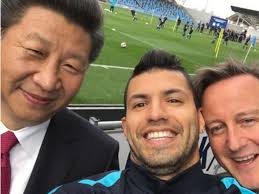When Xi Jinping, the leader of the Chinese government, allowed Manchester City’s Sergio Aguero to take a selfie with him and David Cameron last year, the message was loud and clear: China loves football.
Soon afterwards China Media Capital Holdings paid $400 million (£265 million) to buy 13% of City Football Group, the umbrella company that owns Manchester City, New York City, Melbourne City and is a minority shareholder in Yokohama F. Marinos.
It was a high-profile investment from one of the biggest private-equity groups in the world’s second-largest economy. But by no means was it the only one. From Shanghai SIPG to Shandong Luneng Taishan via Aston Villa and Atlético Madrid, Chinese ownership interests in football are growing.
A new superpower has now emerged in the transfer market. The biggest-name players are not only moving to the European, US or Gulf-state leagues but, even at the pinnacle of their careers, some are now choosing to head east to ply their trades.
In the winter transfer window Ramires, a European Cup winner, moved from Chelsea to Jiangsu Suning. Shortly afterwards the Colombia international forward Jackson Martínez swapped Atlético for Guangzhou Evergrande. Then Brazil’s Hulk switched from Zenit St Petersburg to SIPG.
All three deals set new national transfer records but all of them were only reinforcing what was already a highly successful Chinese game. Led by the national team captain, Zheng Zhi – a former Premier League player with Charlton Athletic – Evergrande are reigning AFC Champions League champions. They also won the elite-competition title two seasons before.
But it is not only Chinese club football that is developing quickly. The women’s national team made a quarter-final appearance at the Olympic Games in Rio last month. Then, despite losing goalkeeper Zeng Cheng to an early injury, China held Asia’s top-ranked nation, Iran, to a 0-0 draw in their FIFA World Cup qualifier in Shenyang, days after narrowly going down 3-2 to Asia’s second-ranked side, Korea, in Seoul.
China’s hopes of a first qualification since their only previous appearance, at the 2002 tournament in Japan and Korea, look increasingly realistic. But whatever the outcome it is clear the Chinese are building for the future.
Last year China’s central government issued a Chinese Football Reform and Development Programme, detailing how all areas of the game from the senior men’s national team to grassroots and schools football would be the focus of a thorough new growth initiative.
The announcement detailed an ambition for China to become “a world-class footballing power” and to bid to host the FIFA World Cup at an unspecified point in the future. One of the lead architects of the Reform and Development Programme has been Zhang Jian, the Senior Vice-President and General Secretary of the Chinese Football Association.
Zhang has proved himself to be a dependable policymaker for sport in China, a nation of 1.4 billion people. Trained in sports law, he was the Director General of Policy and Regulation at the General Administration of Sport prior to joining the CFA in January 2013.
Since then he has risen quickly in football politics, immediately having joined the FIFA Development Committee before becoming President of the East Asian Football Federation in April 2014, a position he held for a two-year term.
He could soon have a major say in global football politics too, as he is bidding for one of the two positions on the FIFA Council that are available to male candidates from the Asian Football Confederation. (As for other confederations in this election, the remaining position in the vote on September 27 must be occupied by a woman).
According to sources, since announcing his candidature, Zhang has travelled extensively around Asia, attending executive-committee meetings of the South Asian Football Federation and the East Asian Football Federation.
He has also visited several other countries for face-to-face contact with voters. His message to them was that he will open access to other countries to the burgeoning football infrastructure it is creating, allowing an entire region to benefit from China’s growth. Zhang’s commitment to bringing Chinese and Asian football to the front rank of nations is clear.
Contact Paul Nicholson, the editor of Insideworldfootball, at moc.l1716090543labto1716090543ofdlr1716090543owedi1716090543sni@n1716090543osloh1716090543cin.l1716090543uap1716090543


